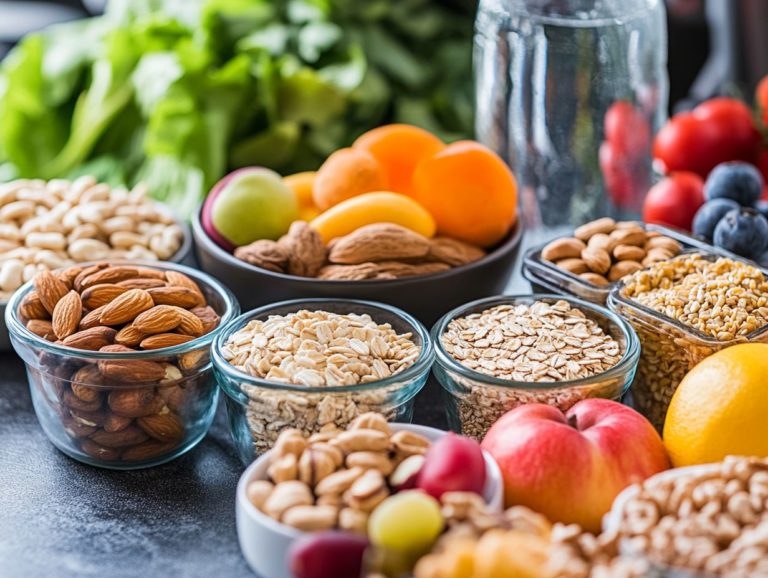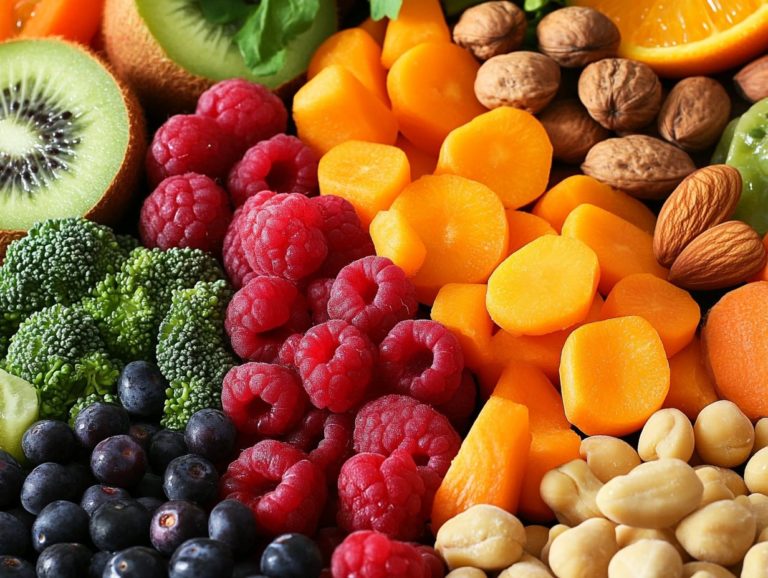The Benefits of Eating Seasonally and Locally
Eating seasonally and locally transcends mere trendiness; it s a lifestyle choice that offers significant benefits for both your health and the environment.
When you opt for fresh, seasonal produce, you not only enjoy enhanced nutritional value but also contribute positively to local ecosystems. Supporting local farmers fortifies communities and guarantees the freshest ingredients grace your plate.
This article delves into the advantages of seasonal and local eating. It provides you with practical tips for meal planning and strategies to tackle common challenges.
Discover how simple changes can transform your diet!
Contents
- Key Takeaways:
- What Does it Mean?
- Benefits of Eating Seasonally
- Benefits of Eating Locally
- How to Incorporate Seasonal and Local Eating into Your Diet
- Challenges and Solutions for Eating Seasonally and Locally
- Frequently Asked Questions
- What does it mean to eat seasonally and locally?
- What are the benefits of eating seasonally and locally?
- Does eating seasonally and locally affect the nutritional value of food?
- Can eating seasonally and locally save money?
- How can I incorporate seasonal and local foods into my diet?
- Are there any downsides to eating seasonally and locally?
Key Takeaways:
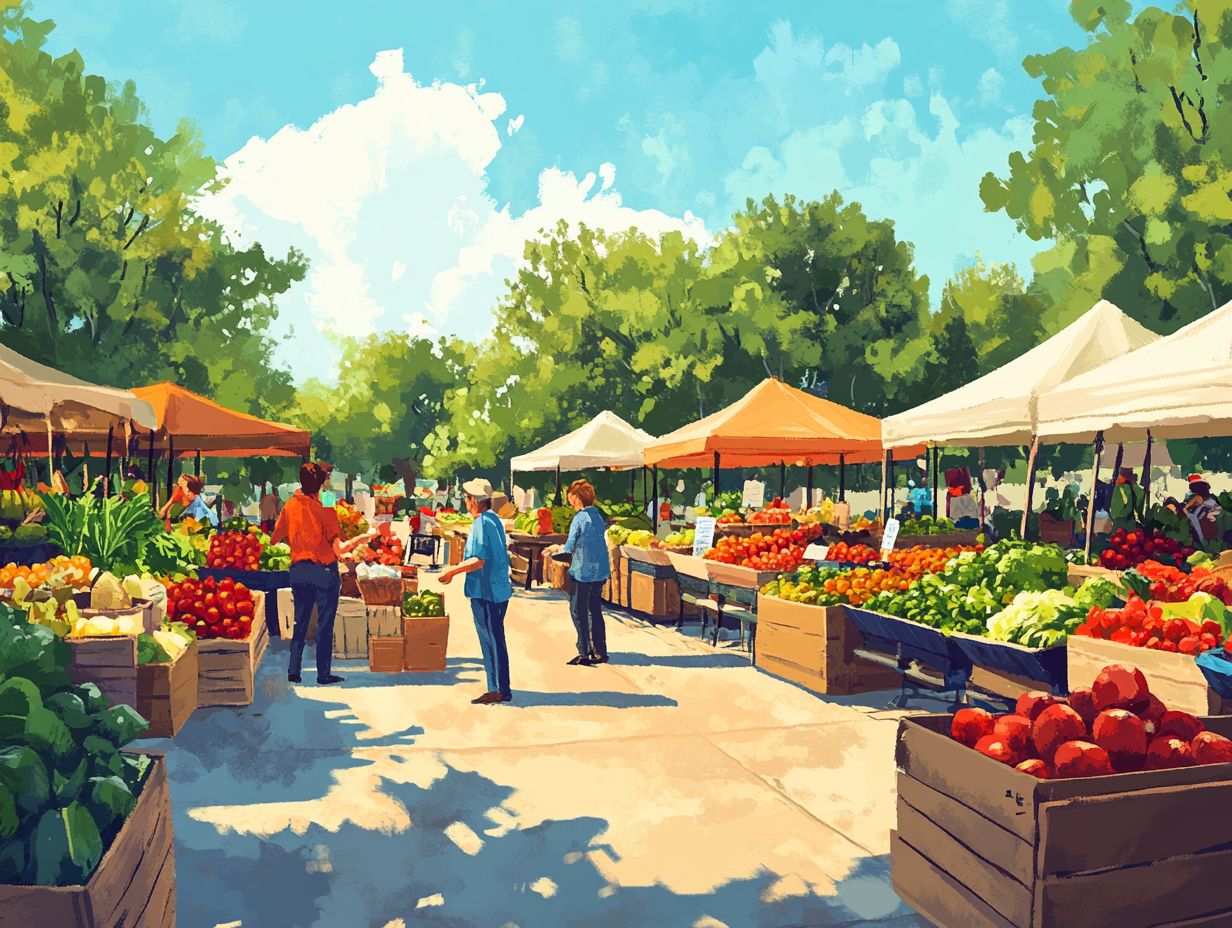
- Eating seasonally provides nutritional benefits by offering fresh, ripe produce that is at its peak in terms of flavor and nutrients.
- Choosing to eat locally not only supports the local economy but also reduces the environmental impact of transportation and packaging of food.
- Incorporating seasonal and local eating into your diet can be done through meal planning and seeking out farmers markets or joining a community-supported agriculture (CSA) program.
What Does it Mean?
Understanding seasonal and local eating means appreciating the importance of food systems that emphasize fresh fruits and vegetables from local farmers. It also highlights the nutritional benefits this approach offers.
Seasonal produce mirrors the natural cycles of harvesting and fosters community connections. This reduces transportation impacts, leading to higher quality food that benefits both you and the environment.
By engaging with local markets and community-supported agriculture, you can make informed choices that enhance your health and positively contribute to the economy.
Benefits of Eating Seasonally
Eating seasonally offers a wealth of benefits that go far beyond mere taste. It enhances nutritional value and supports local economies. Additionally, it cultivates a deeper connection to food systems, ultimately promoting your health and well-being.
When you choose seasonal produce, you’re opting for freshness and flavor, as well as higher nutritional value. This means you’re getting essential vitamins and antioxidants that contribute to your holistic nutrition.
Embracing this practice encourages food diversity and minimizes waste. It aligns your consumption habits with nature’s rhythms.
Nutritional Advantages
The nutritional benefits of indulging in seasonal produce are truly remarkable. These foods are typically harvested at their peak ripeness, resulting in enhanced nutritional value and elevated levels of vitamins and antioxidants.
Fruits and vegetables that ripen naturally not only acquire richer flavors but also exert a more favorable impact on your health compared to their out-of-season counterparts, which often lack essential nutrients.
In contrast, out-of-season varieties are frequently picked before they reach full maturity. They may endure extensive transportation, undermining their overall quality and nutrient content. Seasonal produce is usually more vibrant and brimming with phytochemicals, crucial for boosting your immune system and combating oxidative stress.
By opting for seasonal options, you encourage a varied diet and enjoy a wider range of nutrients throughout the year. Embracing these foods supports local agriculture and presents a delightful array of flavors that significantly contribute to your overall health and well-being.
Join the movement towards seasonal eating your health and the planet will thank you!
Environmental Impact
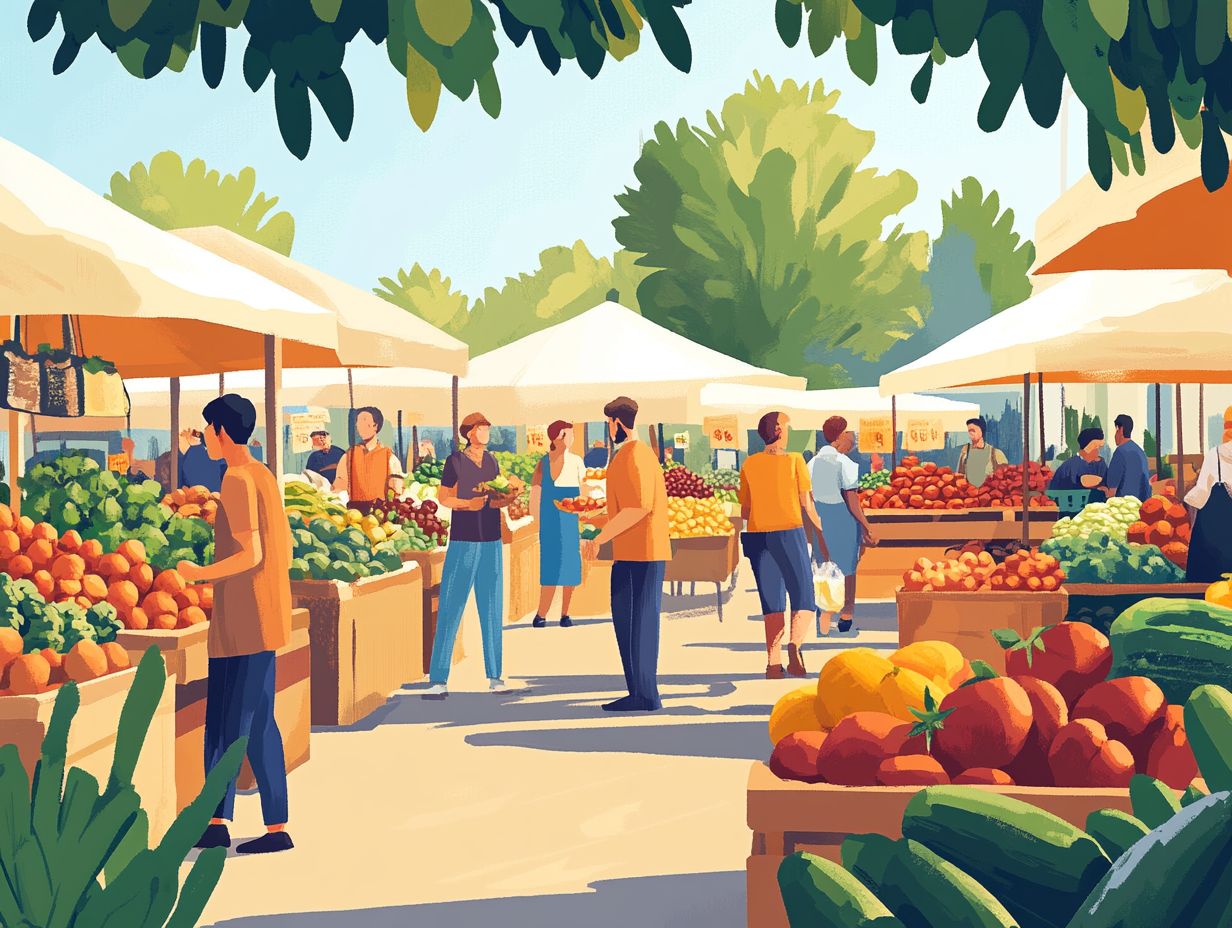
The environmental impact of eating seasonally is significant. By prioritizing locally sourced food, you reduce your carbon footprint and support sustainable diets that benefit local farms.
Choosing seasonal eating minimizes the need for long-distance transportation, which decreases harmful gases that trap heat in the atmosphere and fosters a sustainable food system. This system moves away from industrial agriculture.
This mindful choice encourages biodiversity. It allows farmers to grow different crops suitable for the local climate. This practice enhances soil health and promotes a balanced ecosystem.
By supporting local agricultural practices, you help strengthen community resilience. Local farms often prioritize eco-friendly methods that protect natural resources.
Making sustainable choices means enjoying fresher produce. Fresh food not only tastes better but also retains more nutrients, contributing to long-term public health.
Benefits of Eating Locally
Eating locally offers numerous benefits for you and your community. It enhances the freshness and quality of produce while supporting local farmers and boosting the economy.
By engaging with local food systems, you actively participate in your community. This involvement cultivates connections that enhance food security.
Strengthening your relationships with those who grow your food can occur through farmers markets or community-supported agriculture programs.
Supporting Local Farmers and Economy
Supporting local farmers is a powerful way to boost our economy and strengthen our community bonds! By investing directly in your region’s agricultural products, you ensure that local farmers receive fair compensation for their hard work.
This choice empowers you to make informed consumer decisions that prioritize quality and nutritional value in your food.
When you purchase directly from growers, you re not just buying food. You contribute to the overall well-being of your community and enhance food security.
These relationships foster trust and transparency, allowing you to learn about where your food comes from and the sustainable practices behind its production.
The connections you make with local farmers help create a resilient food system capable of weathering economic challenges. This ensures that fresh, accessible food remains a staple in local diets, boosting the economy through reinvestment in community resources.
Freshness and Quality of Produce
The freshness and quality of produce truly shine when you embrace local eating. Fruits and vegetables from nearby farms often retain more flavor and nutritional value compared to those shipped from afar.
For example, tomatoes picked at their peak ripeness from a local garden burst with flavor and essential vitamins. In contrast, tomatoes that travel long distances may be harvested early, resulting in bland, less nutritious options.
Similarly, consider seasonal berries like strawberries or blueberries that thrive in your local climate. When enjoyed fresh during summer, they offer richer tastes and higher antioxidant levels.
The difference is clear; the crunchiness of freshly harvested carrots or the sweetness of locally grown apples enhances flavor and transforms your entire eating experience, reinforcing the value of choosing local produce.
So, visit your local farmers market or try a seasonal recipe today!
How to Incorporate Seasonal and Local Eating into Your Diet
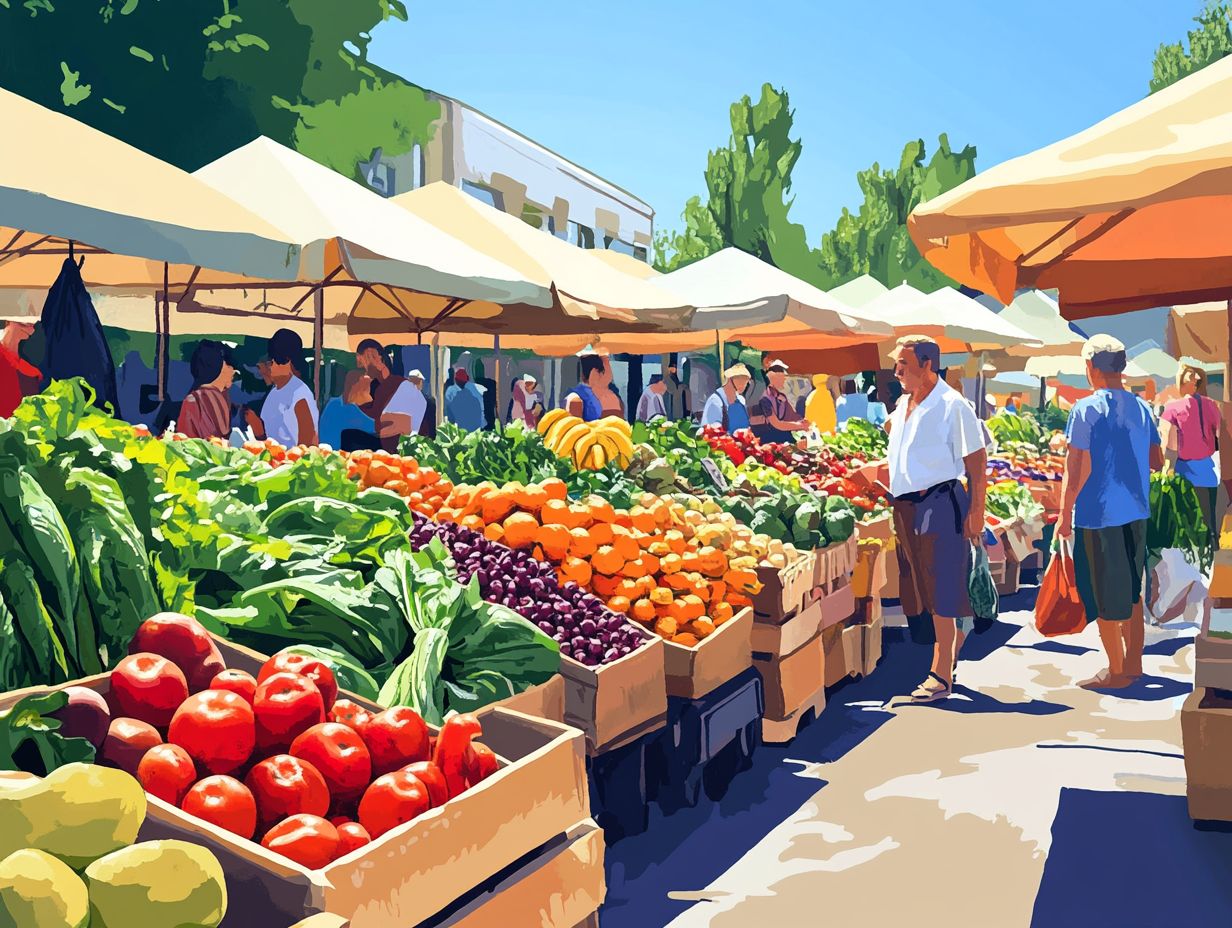
Incorporating seasonal and local eating into your diet can transform your cooking experience into a delightful adventure! This approach elevates your meals, supports your health, and boosts the local economy.
By planning meals around fresh fruits and vegetables in season, you can create exquisite dishes while enjoying enhanced nutrition and sustainability. This strategy allows you to indulge in a diverse array of flavors and nutrients throughout the year!
Tips and Tricks for Meal Planning
Effective meal planning is essential for incorporating seasonal and local produce into your diet. Start by understanding which ingredients are available throughout the year.
Research seasonal fruits and vegetables and integrate them into your recipes. This way, you can create meals that are delicious and nutritionally rich while supporting local farmers.
Create seasonal ingredient charts that detail what’s available each month. This will guide your grocery shopping and inspire meal choices!
Explore new recipes that showcase these ingredients. Keeping your meals exciting and diverse is key!
Preserve fresh produce through methods like freezing or canning. This can extend shelf life and minimize waste, letting you enjoy seasonal flavors year-round.
Engaging in these practices enhances personal health and fosters community connections. It promotes a more sustainable food system!
Challenges and Solutions for Eating Seasonally and Locally
While there are many advantages to embracing seasonal and local eating, several challenges could discourage you from fully committing to this lifestyle.
Factors like limited access to fresh produce, the often higher costs of local foods, and a general lack of knowledge about seasonal eating can create significant hurdles.
Recognizing and addressing these challenges is essential for cultivating a more sustainable food system and enhancing community health.
Overcoming Obstacles
Overcoming the hurdles of seasonal and local eating requires a thoughtful, multifaceted strategy! This intertwines community support, education, and resourcefulness.
Engage in local food programs, tap into community-supported agriculture, and nurture relationships with local farmers. This will help you incorporate fresh, seasonal produce into your diet.
Many community initiatives aim to reduce both access barriers and costs associated with sourcing local food. For instance, local farmers’ markets often accept SNAP benefits to help low-income families purchase fresh produce.
Educational workshops focusing on cooking with seasonal ingredients empower you to experiment in the kitchen! This helps bust the myth that healthy eating is overly pricey or time-consuming.
Community gardens offer hands-on learning experiences. You can grow your own food while fostering a sense of belonging and responsibility toward your environment.
These collective efforts highlight the importance of collaboration and knowledge-sharing in the quest for a more sustainable food system!
Frequently Asked Questions
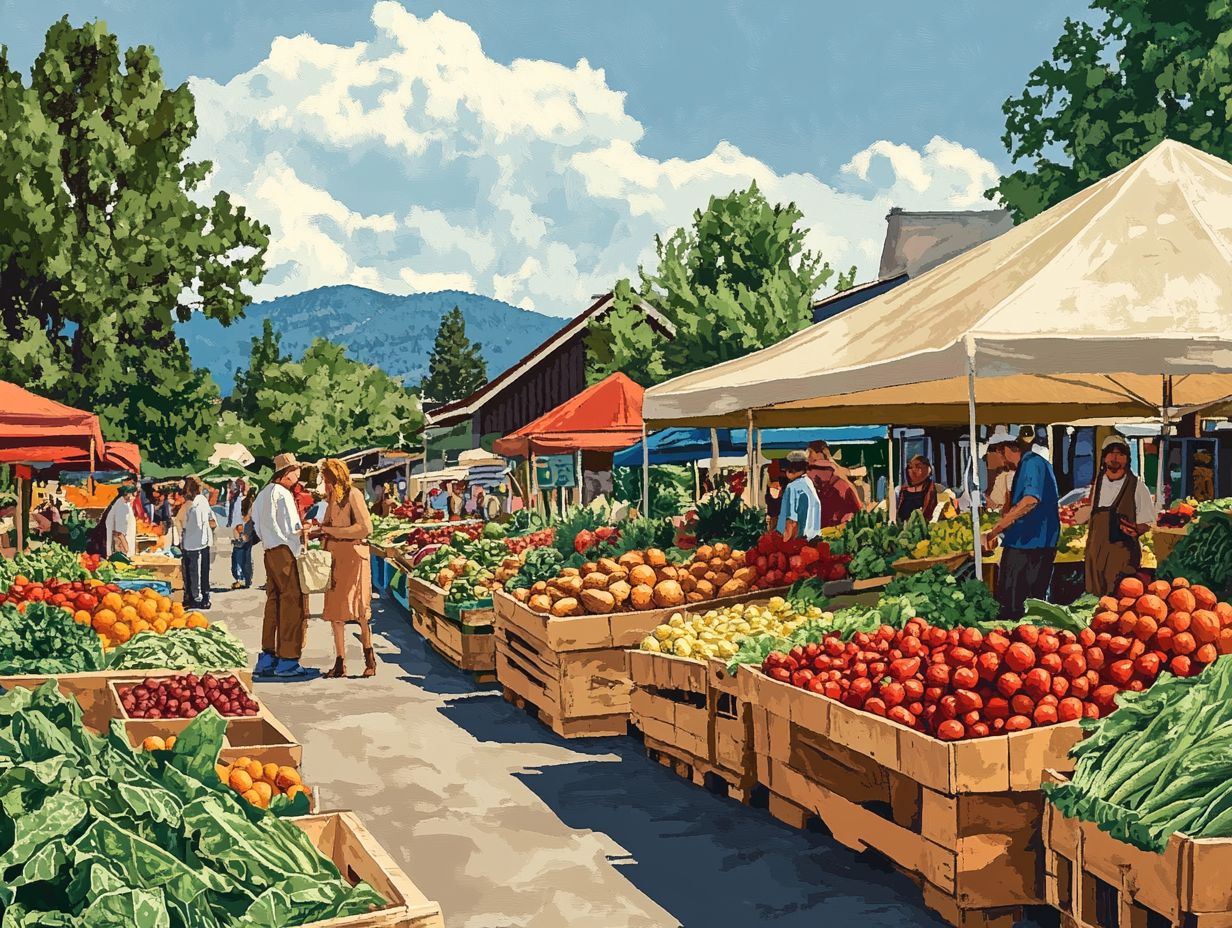
What does it mean to eat seasonally and locally?
Eating seasonally means enjoying foods that are in season, like squash in the fall and berries in summer. Eating locally means sourcing your food from nearby farms and markets!
What are the benefits of eating seasonally and locally?
Eating seasonally and locally allows you to consume fruits and vegetables at their peak freshness and flavor. It also supports local farmers and reduces the environmental impact of transportation!
Start planning your seasonal meals today for a healthier and more delicious diet!
Does eating seasonally and locally affect the nutritional value of food?
Yes, eating seasonally and locally boosts the nutritional value of food. Fruits and vegetables that are picked ripe and consumed quickly have more nutrients than those that are picked early and shipped long distances.
Can eating seasonally and locally save money?
Yes, it can save you money, depending on your location and the availability of local produce. Seasonal foods are often abundant and more affordable. Buying directly from farmers at local markets cuts out middlemen and reduces costs.
How can I incorporate seasonal and local foods into my diet?
Meal planning based on what’s in season is a great way to start. You can also join a community-supported agriculture (CSA) program, which delivers a weekly box of fresh, local produce right to your door.
Are there any downsides to eating seasonally and locally?
One downside is the limited variety. You might miss out on some delicious fruits and veggies throughout the year, so be ready to get creative with your recipes. Availability may also vary by area, which can make seasonal eating a challenge.
Start enjoying the delicious benefits of seasonal eating today!

